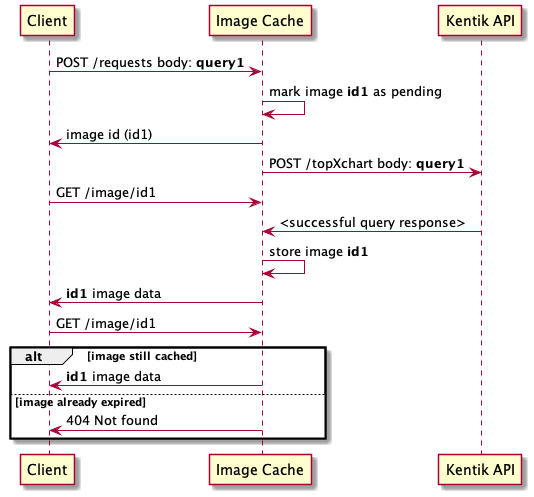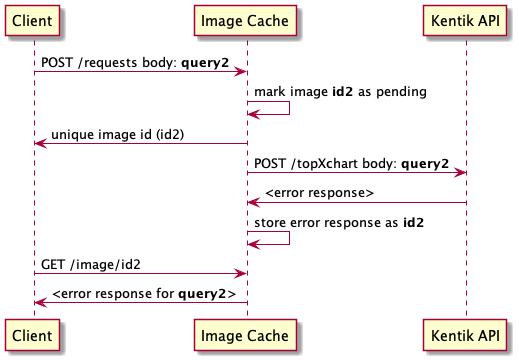Application for caching of images rendered by the /query/topxchart Kentik API method.
The application provides API method allowing to invoke /query/topxchart Kentik API method and returns unique identifiers
which can be later used to retrieve the corresponding image (or error message).
TLS and eventual user authentication must be handled by external proxy (e.g. Traefik)
| end-point | method | operation | request data | response data |
|---|---|---|---|---|
| /requests | POST | Initiate query request to Kentik API’s /query/topxchart end-point | api_query: JSON object (passed to Kentik API without modification), ttl: (optional int) desired storage duration in seconds | On success: image ID, On error: JSON error message |
| /image/{id} | GET | Retrieve previously requested image | None | On success: Image data according to the format specified in the corresponding request, On error: Status code and error message returned by Kentik API |
| /info | GET | Return information about cache content | None | JSON object |
| /favicon.ico | GET | Return favicon | None | image/x-icon |
Unique image identifiers returned by the app are constructed as:
sha256(<query_data>).hexdigest_<expiration_time_in_unix_epoch>
Example:
4295aa38281c869ae8827320d407bf1dd1f38a7bf65af00551ce461e70f863d5\_1620973821.2844
The application has following configurable parameters which can be either provided in environment variables (variables names must be all capital letters) or in the .env file in the root folder of the app:
| parameter | required | purpose | default value |
|---|---|---|---|
| KT_AUTH_EMAIL | yes | Authentication to Kentik API | |
| KT_AUTH_TOKEN | yes | Authentication to Kentik API | |
| KENTIK_API_URL | no | URL of Kentik API service | https://api.kentik.com/api/v5 |
| KENTIK_API_RETRIES | no | Number of retries on transient failures | 3 |
| KENTIK_API_TIMEOUT | no | Timeout for requests to Kentik API | 60 seconds |
| DEFAULT_TTL | no | Default cache entry lifetime | 300 seconds |
| ENTRY_WAIT_TIMEOUT | no | Timeout for cache entry to become active | retries * timeout + 5 seconds |
| CACHE_PATH | yes | Directory for storing cached content | |
| CACHE_MAINTENANCE_PERIOD | no | Interval for periodic cache pruning | 60 seconds |
On POST request to the /requests end-point, the Image Cache performs following actions:
- generates unique image id
- attempts to locate entry with the same id in the cache
if not found create new pending entry storing the request body start background task for retrieving the image from Kentik API else store the image id of the entry - returns the image id to the client
On successful retrieval of the image from Kentik API, Image Cache:
- stores the image data in the pending entry
- marks the entry active
On GET request to the /image/ end-point, the Image Cache:
- attempts to locate the entry in the cache
if found
if expired
return 404 to the client
if pending
return 200 and image data to the client
wait for entry to become active
if active
return 200 and image data to the client
else
return 500 error to the client
else
return 404 error to the client
The current design assumes that local storage used by the cache is persistent and services application/container restarts. If this is not true, application restart will obviously cause all cached content to be lost. On application restart, the Image Cache initializes the local cache before beginning to server requests on the 2 API end-points. Cache initialization steps:
- Load data to cache from filesystem
- Walk all pending entries
- remove expired entries
- start retrieval of images from Kentik API (using the query data stored in pending entries) for remaining entries
- Walk all active entries and remove expired ones
- Python 3.8 or newer
- FastAPI
- kentik-api 0.2.0 (or newer)
The bellow procedure assumes:
- Unix/Linux-like operating system
- functional
gitinstallation - Docker executed on the host on which the image is built
- User running the procedure has sufficient permissions, including communication with the docker server
git clone https://github.com/kentik/kentik_image_cache.gitcd kentik_image_cache
docker build -t kentik_image_cache .The directory should be located on filesystem with enough of disk space and must be readable and writeable to the user with whose identity Docker containers are executed.
mkdir -p /opt/kentik_image_cache
chown root:docker /opt/kentik_image_cacheThe bellow procedure passes Kentik authentication to the container via environment variables.
- <kentik_user_mail> has to be replaced with the e-mail registered with the Kentik user
- <kentik_api_token> has to be replaced with API token of that user.
Access to Kentik API must be allowed from the external IP address of the Docker container.
docker run -d --name kentik_image_cache \
--env KT_AUTH_EMAIL=<kentik_user_mail> \
--env KT_AUTH_TOKEN=<kentik_api_token> \
-v /opt/kentik_image_cache:/cache -p 80:80 kentik_image_cacheCredentials and other configuration information can be also provided via environment file:
echo "KT_AUTH_EMAIL=<kentik_user_mail>" > .env
echo "KT_AUTH_TOKEN=<kentik_api_token>" >> .env
docker run -d --name kentik_image_cache --env-file .env \
-v /opt/kentik_image_cache:/cache -p 80:80 kentik_image_cacheThe bellow procedure assumes:
- Unix/Linux-like operating system
- functional
gitinstallation - Python 3.8 or newer installed as
python3
git clone https://github.com/kentik/kentik_image_cache.gitcd kentik_image_cache
python3 -m venv venvvenv/bin/pip3 install -r requirements.txtNote: the cache directory must not be in the repo tree in order for the uvicorn --reload feature to work correctly.
mkdir /tmp/cacheecho "KT_AUTH_EMAIL=<kentik_user_mail>" > .env
echo "KT_AUTH_TOKEN=<kentik_api_token>" >> .env
echo "CACHE_PATH=/tmp/cache" >> .envDEBUG=1 venv/bin/uvicorn app.main:app --reload- API spec and tester: http://127.0.0.1:8000/docs
- Cache content info: http://127.0.0.1:8000/info
Simple integration test script tests/run_tests.py can be used to test a fully configured instance
of the image cache (it must have nertwork access and valid credentials to access Kentik API).
The test script (by default) uses requests stored in tests/data.
Example of running all test requests concurrently against URL http://127.0.0.1:8000:
tests/run_tests.py --concurrent --url http://127.0.0.1:8000
2021-05-27 23:00:53 Using URL: http://127.0.0.1:8000
2021-05-27 23:00:53 tid: 0 loading request from: tests/data/bad_query.json
2021-05-27 23:00:53 tid: 1 loading request from: tests/data/example_query_1.json
2021-05-27 23:00:53 tid: 2 loading request from: tests/data/example_query_2.json
2021-05-27 23:00:53 tid: 3 loading request from: tests/data/example_query_3.json
2021-05-27 23:00:53 tid: 4 loading request from: tests/data/example_query_4.json
2021-05-27 23:00:53 5 requests loaded
2021-05-27 23:00:53 Running tests concurrently
2021-05-27 23:00:53 tid: 0 posting request
2021-05-27 23:00:53 tid: 1 posting request
2021-05-27 23:00:53 tid: 2 posting request
2021-05-27 23:00:53 tid: 3 posting request
2021-05-27 23:00:53 tid: 4 posting request
2021-05-27 23:00:53 tid: 0: got id: 53693a077a6e1eec6407df161ae964d34170a7743e67488b0ece175005ac69aa_1622181773.873009
2021-05-27 23:00:53 tid: 2: got id: d8e8c3038d31e454971f6a067a4190d9a34f9d1a8415ff3260939a0ca53e6436_1622181953.864447
2021-05-27 23:00:53 tid: 3: got id: 4f2278d1a4d4d5a202a9972027d05e9ac13032b00282b5c2b67a79b60002cb7c_1622181773.848177
2021-05-27 23:00:53 tid: 3 requesting: http://127.0.0.1:8000/image/4f2278d1a4d4d5a202a9972027d05e9ac13032b00282b5c2b67a79b60002cb7c_1622181773.848177
2021-05-27 23:00:53 tid: 0 requesting: http://127.0.0.1:8000/image/53693a077a6e1eec6407df161ae964d34170a7743e67488b0ece175005ac69aa_1622181773.873009
2021-05-27 23:00:53 tid: 1: got id: fbdaa71df680024289416c97b392d55c2ce218e8a69054ff084f032bbfb3f867_1622182253.88189
2021-05-27 23:00:53 tid: 1 requesting: http://127.0.0.1:8000/image/fbdaa71df680024289416c97b392d55c2ce218e8a69054ff084f032bbfb3f867_1622182253.88189
2021-05-27 23:00:53 tid: 2 requesting: http://127.0.0.1:8000/image/d8e8c3038d31e454971f6a067a4190d9a34f9d1a8415ff3260939a0ca53e6436_1622181953.864447
2021-05-27 23:00:53 tid: 4: got id: 5d8ed88d722d32ca3b42883671a27a7cbd76140bf8b154dc471936b291118d1c_1622181713.891764
2021-05-27 23:00:53 tid: 4 requesting: http://127.0.0.1:8000/image/5d8ed88d722d32ca3b42883671a27a7cbd76140bf8b154dc471936b291118d1c_1622181713.891764
2021-05-27 23:00:54 tid: 0 got: status: 400 type: application/json length: 194
2021-05-27 23:01:01 tid: 1 got: status: 200 type: image/png length: 61117
2021-05-27 23:01:01 tid: 2 got: status: 200 type: image/png length: 71561
2021-05-27 23:01:02 tid: 3 got: status: 200 type: image/png length: 147938
2021-05-27 23:01:04 tid: 4 got: status: 200 type: application/pdf length: 73343Example of running all tests matching example_*.json sequentially against http://127.0.0.1:8000:
tests/run_tests.py --glob 'example_*.json' --url http://127.0.0.1:8000
2021-05-27 22:59:21 Using URL: http://127.0.0.1:8000
2021-05-27 22:59:21 tid: 0 loading request from: tests/data/example_query_1.json
2021-05-27 22:59:21 tid: 1 loading request from: tests/data/example_query_2.json
2021-05-27 22:59:21 tid: 2 loading request from: tests/data/example_query_3.json
2021-05-27 22:59:21 tid: 3 loading request from: tests/data/example_query_4.json
2021-05-27 22:59:21 4 requests loaded
2021-05-27 22:59:21 Running tests
2021-05-27 22:59:21 tid: 0 posting request
2021-05-27 22:59:22 tid: 0: got id: fbdaa71df680024289416c97b392d55c2ce218e8a69054ff084f032bbfb3f867_1622182162.004539
2021-05-27 22:59:22 tid: 0 requesting: http://127.0.0.1:8000/image/fbdaa71df680024289416c97b392d55c2ce218e8a69054ff084f032bbfb3f867_1622182162.004539
2021-05-27 22:59:28 tid: 0 got: status: 200 type: image/png length: 60706
2021-05-27 22:59:28 tid: 1 posting request
2021-05-27 22:59:28 tid: 1: got id: d8e8c3038d31e454971f6a067a4190d9a34f9d1a8415ff3260939a0ca53e6436_1622181868.80616
2021-05-27 22:59:28 tid: 1 requesting: http://127.0.0.1:8000/image/d8e8c3038d31e454971f6a067a4190d9a34f9d1a8415ff3260939a0ca53e6436_1622181868.80616
2021-05-27 22:59:37 tid: 1 got: status: 200 type: image/png length: 72078
2021-05-27 22:59:37 tid: 2 posting request
2021-05-27 22:59:37 tid: 2: got id: 4f2278d1a4d4d5a202a9972027d05e9ac13032b00282b5c2b67a79b60002cb7c_1622181697.10503
2021-05-27 22:59:37 tid: 2 requesting: http://127.0.0.1:8000/image/4f2278d1a4d4d5a202a9972027d05e9ac13032b00282b5c2b67a79b60002cb7c_1622181697.10503
2021-05-27 22:59:46 tid: 2 got: status: 200 type: image/png length: 146699
2021-05-27 22:59:46 tid: 3 posting request
2021-05-27 22:59:46 tid: 3: got id: 5d8ed88d722d32ca3b42883671a27a7cbd76140bf8b154dc471936b291118d1c_1622181646.687514
2021-05-27 22:59:46 tid: 3 requesting: http://127.0.0.1:8000/image/5d8ed88d722d32ca3b42883671a27a7cbd76140bf8b154dc471936b291118d1c_1622181646.687514
2021-05-27 22:59:56 tid: 3 got: status: 200 type: application/pdf length: 72974Full usage help:
tests/run_tests.py --help
Usage: run_tests.py [OPTIONS]
Options:
--url TEXT URL to test against [default: http://127.0.0.1]
--dir TEXT Directory to load requests from [default: tests/data]
--glob TEXT Globbing pattern for request files [default: *.json]
--concurrent Run requests concurrently [default: False]
--help Show this message and exit.
Note: Full unit test suite is in development.

